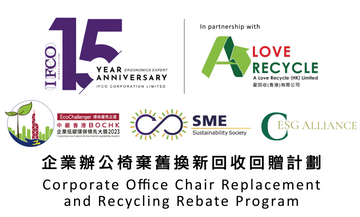【ESG】How ergonomic furniture help company to get higher score of ESG?
by Samuel Sun on May 07, 2024

Introduction:
In today's business landscape, organizations are increasingly recognizing the importance of environmental, social, and governance (ESG) considerations. ESG criteria evaluate an organization's sustainability performance and its impact on society.
What is ESG?
ESG uses standard criteria to evaluate and demonstrate the sustainability performance and success of an organization. Stakeholders expect organizations to not only deliver financial performance but also to make a positive contribution to society:
- Environmental criteria consider how an organization performs as a steward of nature
- Social criteria address how an organization manages social relationships with employees, suppliers, customers and the communities where it operates
- Governance deals with an organization’s leadership, executive pay, audits, internal controls and shareholder rights
How ergonomic furniture help company to get higher score of ESG?
One area where companies can make a significant positive impact is through the implementation of ergonomic furniture, such as standing desks and ergonomic chairs. But how incorporating ergonomic furniture can help companies improve their ESG and contribute to a more sustainable and responsible future?
Social Responsibility:
Investing in ergonomic furniture showcases a company's commitment to social responsibility. By providing employees with ergonomic chairs and adjustable standing desks, organizations prioritize employee health and well-being. These ergonomic solutions reduce the risk of work-related injuries and musculoskeletal disorders, fostering a safe and comfortable work environment. By demonstrating care for their workforce, companies enhance employee satisfaction, engagement, and overall social well-being.
Employee Productivity and Efficiency:
Ergonomic furniture directly impacts employee productivity and efficiency. A comfortable and supportive work environment reduces discomfort and fatigue, enabling employees to work more effectively. Ergonomic chairs provide proper posture support, while standing desks promote movement and alleviate the negative effects of prolonged sitting. By enhancing employee performance, organizations improve their financial outcomes, aligning with ESG's focus on delivering financial performance while considering social factors.
Talent Attraction and Retention:
Companies that prioritize employee well-being through ergonomic workspaces gain a competitive edge in attracting and retaining top talent. In today's workforce, employees seek employers who value their health and offer supportive work environments. By providing ergonomic furniture, organizations demonstrate their commitment to employee welfare, fostering a positive employer brand and enhancing their social impact.
Environmental Sustainability:
Ergonomic furniture can contribute to a company's environmental sustainability efforts. Many ergonomic products are designed with eco-friendly materials and manufacturing processes. By choosing sustainable materials, minimizing waste, and incorporating energy-efficient features, organizations reduce their environmental footprint. Ergonomic workspaces also encourage healthier habits, such as reducing sedentary behavior and optimizing natural light usage, further promoting environmental conservation.
Resource Efficiency:
Ergonomic furniture promotes resource efficiency. Height-adjustable desks and energy-saving features help optimize energy usage by adapting to user needs and powering down when not in use. By conserving resources and reducing energy consumption, organizations showcase their commitment to responsible resource management and environmental stewardship, which are key aspects of ESG.
Conclusion:
Incorporating ergonomic furniture, including standing desks and ergonomic chairs, demonstrates a company's commitment to social responsibility, employee well-being, and environmental sustainability. The positive impact on employee health, productivity, talent attraction, and resource efficiency aligns with the social and environmental aspects of ESG. By prioritizing ergonomic workspaces, organizations not only enhance their ESG performance but also contribute to a more sustainable future. Embracing ergonomic furniture is a meaningful step towards achieving higher ESG scores, fostering employee well-being, and establishing a responsible corporate culture.



